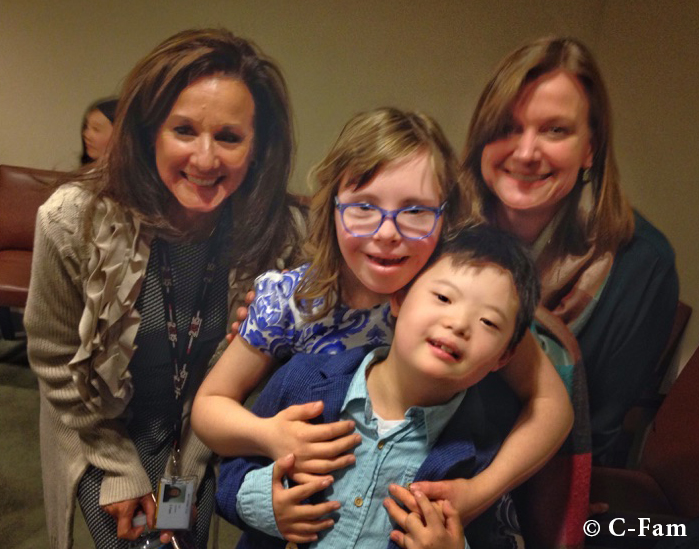Parents of Down Syndrome Girl Tell UN That the Family Protects Kids

Kurt Kondrich, Susan Yoshihara, Ph.D., Valerie Huber, and Professor W. Bradford Wilcox, Ph.D.
NEW YORK, March 17 (C-Fam) When tests showed Kurt Kondrich’s unborn daughter Chloe had Down syndrome, the doctors’ only advice was to abort her.
“I’m a police officer, sworn to protect lives,” he said. But the message from medical professionals was, “If you don’t like how your daughter is made up genetically, you can kill her and walk away with no consequences from the hospital.”
Now 13 years old, Chloe has met with the state governor and rock stars, plays baseball and was pictured on a Time Square billboard. Pennsylvania’s “Chloe’s Law,” named after her, requires that when parents receive a prenatal diagnosis, they also be given information on services available to support the child and family.
Other mothers should not be treated as callously as his wife, Kurt said. “They told us our daughter would be a burden. But they never told us how happy we would be raising our beautiful girl.”
Kurt spoke on a panel to an overflow crowd at the UN. He was joined by two experts who verified that families provide the safest place for children, particularly girls and special needs children.
Global attention has “focused on the number of people born, but not the nature of the homes where kids are raised,” said University of Virginia professor Brad Wilcox. “Family structure is linked to kids’ outcome” and “family environments impact the community.”
Wilcox, raised by a single mother and the father of nine children, presented statistics from around the world demonstrating that two-parent marriages, irrespective of nation or social status, improve children’s health, education and a host of other outcomes.
Two parent families provide stable routines and care giving, and generally have more time, money, affection and sense of kinship for their kids that reduces the likelihood of abuse.
Cohabiting couples are less stable and often end in single parenthood. When a father is not around to watch out for their kids or pay attention to their friends, girls are more likely to be taken advantage of.
The path towards social, economic and physical progress for the world’s children lies in part on “protecting marriage and family life where strong, and renewing marriage and family life where fragile,” Professor Wilcox concluded.
A step to avoiding single parenthood is helping kids avoid sex, not just reducing risky sex, explained Valerie Huber, President of ASCEND. The best form of sex education, like any other public health issue, helps children avoid, not just reduce, the activity that puts a person at risk of outcomes they’re not ready to handle, including disease and abuse.
In most nations, teens wait for sex until after high school.

Dr. Susan Yoshihara, Lisa Correnti, Chloe and Alex at a UN event prior to World Down Syndrome Day
“Sex Risk Avoidance” empowers young women, who have more to lose when they engage in early sex, to build barriers, refusal skills, healthy decisions, parent-teen relationships, to set goals and think of the future not just tomorrow. It is the alternative to comprehensive sexuality education—the curriculum promoted by Planned Parenthood and other abortion advocates—that “normalizes sex as an expectation for teens,” Huber said.
A Saudi Arabian diplomat told the panel that, as a medical professional, she saw parents as they were told a prenatal diagnosis—and now sees the importance of the role of health care providers to ease the anxiety of parents for what to expect.
The panel was sponsored by twenty-five countries of the Group of the Friends of the Family, and organized by C-Fam, publisher of the Friday Fax.
View online at: https://c-fam.org/friday_fax/parents-syndrome-girl-tell-un-family-protects-kids/
© 2026 C-Fam (Center for Family & Human Rights).
Permission granted for unlimited use. Credit required.
www.c-fam.org








